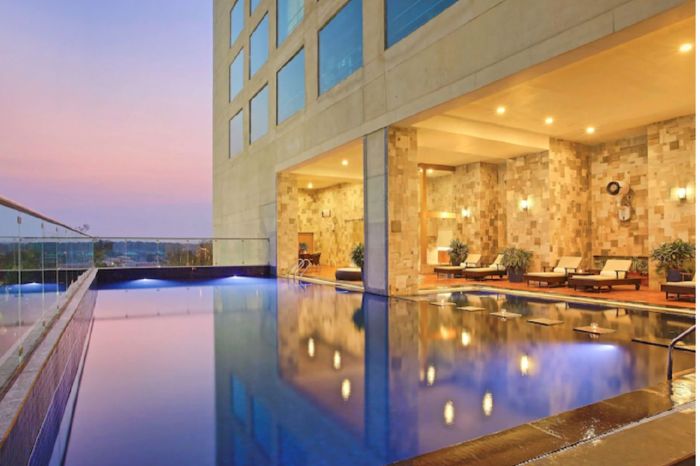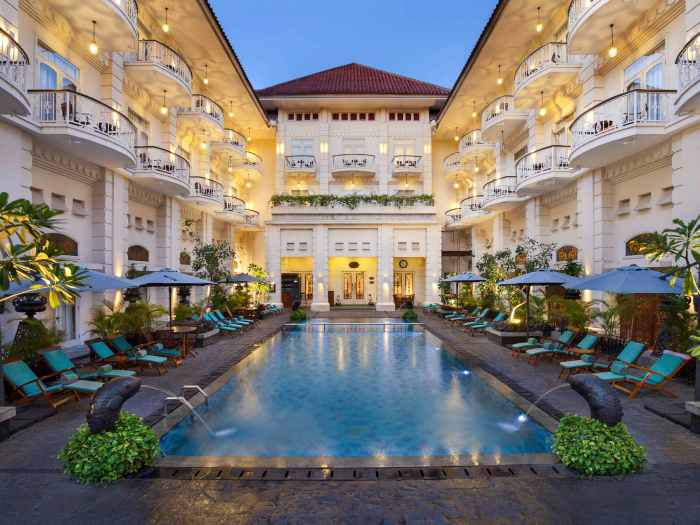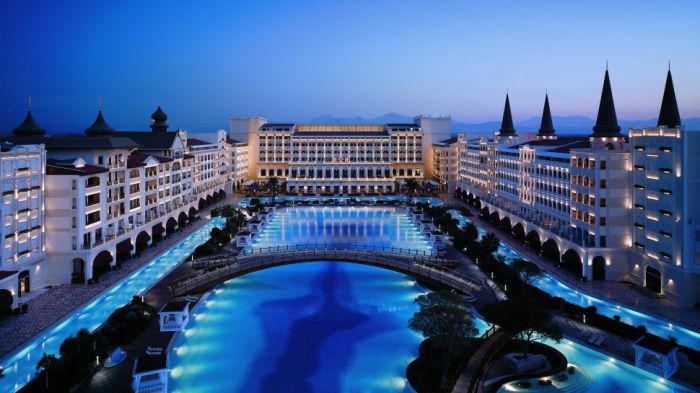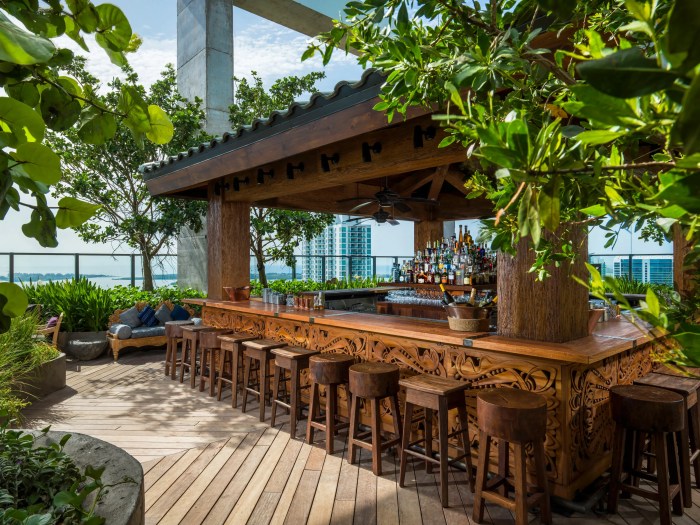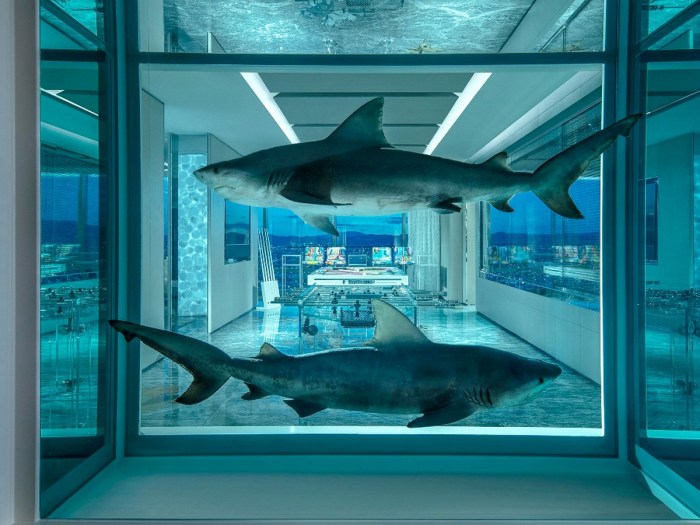Unique Boutique Hotels You Shouldn’t Miss: Discover a world of unparalleled elegance and personalized experiences. This exploration delves into the captivating realm of boutique hotels, highlighting their distinctive characteristics, architectural styles, and exceptional amenities. We’ll journey across diverse geographic locations, uncovering the cultural influences that shape their unique identities and the innovative trends shaping their future. Prepare to be inspired by the artistry and personalized service that sets these hotels apart from the ordinary.
From the meticulously crafted design elements to the exceptional guest services, boutique hotels offer a level of intimacy and personalization rarely found in larger chain establishments. This journey will showcase a curated selection of these hidden gems, each offering a distinctive ambiance and unforgettable experience. We will examine architectural styles, explore unique amenities, and delve into the cultural contexts that contribute to their allure, ultimately providing a comprehensive guide for discerning travelers seeking truly memorable stays.
Introduction
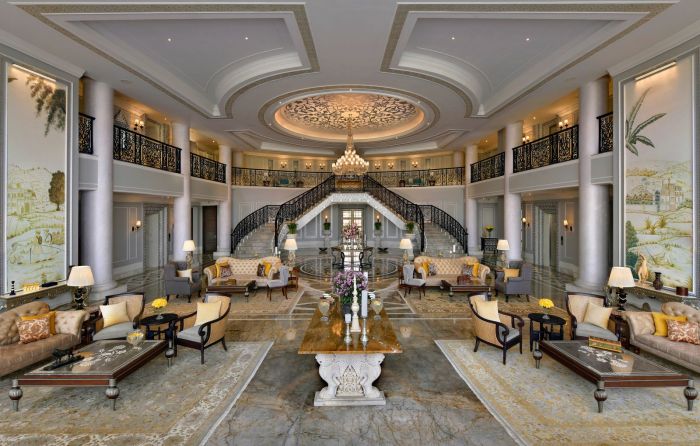
Boutique hotels offer a distinct alternative to the standardized experience of larger hotel chains. They are characterized by a focus on individualized service, unique design, and a curated atmosphere, often reflecting the local culture or a specific theme. Unlike standard hotels aiming for mass appeal, boutique hotels prioritize creating a memorable and personalized stay for each guest. This is achieved through meticulous attention to detail, creating an intimate and stylish environment that is far removed from the impersonal feel of a large chain hotel.Boutique hotels stand out through a combination of factors.
Their size is inherently smaller, allowing for more personalized service and a greater sense of intimacy. The design is often highly curated, reflecting a specific aesthetic or theme, which contributes to a unique and memorable experience. Furthermore, the level of service is typically elevated, with a strong emphasis on personal attention and customized experiences for guests.
Design Elements and Services in Unique Boutique Hotels
The design of a unique boutique hotel is a key differentiator. Common elements include bespoke furniture, locally sourced artwork, and carefully chosen textiles. Think hand-painted murals depicting local scenes, antique furnishings giving a sense of history, or modern minimalist designs utilizing natural materials like reclaimed wood and stone. The overall aesthetic aims to create a sense of place, often reflecting the local culture or a specific design philosophy.
Beyond aesthetics, unique boutique hotels often provide a range of bespoke services, such as personalized concierge services, curated local experiences, and in-room amenities tailored to individual guest preferences. For example, a hotel might offer a complimentary wine tasting experience showcasing local vineyards or arrange a private cooking class focusing on regional cuisine. The goal is to create a truly immersive and memorable experience that extends beyond simply providing a place to sleep.
Geographic Locations of Unique Boutique Hotels
Boutique hotels offer a distinct travel experience, moving beyond the standardized offerings of larger chains. Their unique charm often stems from their location and the cultural context in which they are embedded. Exploring these geographic regions reveals how local traditions, architecture, and artistry shape the guest experience.
Five Distinct Geographic Regions for Exceptional Boutique Hotels
The global landscape boasts numerous regions renowned for their exceptional boutique hotels. Five distinct areas stand out for their unique cultural influences on hotel design and guest experience: the Amalfi Coast (Italy), Marrakech (Morocco), Santorini (Greece), Kyoto (Japan), and the Napa Valley (California, USA). Each region offers a profoundly different yet equally captivating experience.
Cultural Influences on Hotel Design and Experiences
The cultural aspects of each region profoundly impact the design and experience of its boutique hotels. For instance, hotels on the Amalfi Coast often incorporate vibrant colors, local ceramics, and breathtaking coastal views, reflecting the region’s lively spirit and stunning scenery. In contrast, Moroccan riads in Marrakech showcase intricate tilework, tranquil courtyards, and traditional architecture, creating an atmosphere of serenity and cultural immersion.
The stark beauty of Santorini’s volcanic landscape inspires minimalist designs with whitewashed walls, reflecting pools, and breathtaking caldera views. Kyoto’s boutique hotels often feature traditional Japanese architecture, serene gardens, and minimalist aesthetics, emphasizing tranquility and connection with nature. Finally, Napa Valley’s boutique hotels often blend rustic charm with modern luxury, reflecting the region’s wine country heritage and sophisticated ambiance.
Comparison of Unique Hotel Offerings Across Regions
| Region | Notable Hotel Features | Cultural Influences | Price Range |
|---|---|---|---|
| Amalfi Coast, Italy | Coastal views, vibrant colors, local ceramics, outdoor terraces | Italian craftsmanship, Mediterranean lifestyle, coastal culture | $$$ – $$$$ |
| Marrakech, Morocco | Intricate tilework, tranquil courtyards, traditional riad architecture, hammams | Moorish architecture, Berber traditions, vibrant souks | $$ – $$$$ |
| Santorini, Greece | Caldera views, whitewashed walls, minimalist design, infinity pools | Cycladic architecture, Aegean Sea culture, volcanic landscape | $$$ – $$$$ |
| Kyoto, Japan | Traditional Japanese architecture, serene gardens, minimalist aesthetics, tatami mats | Zen Buddhism, Japanese tea ceremony, traditional craftsmanship | $$ – $$$$ |
| Napa Valley, California, USA | Vineyard views, rustic charm, modern luxury, wine tasting experiences | Wine country heritage, Californian lifestyle, agricultural landscape | $$$ – $$$$$$ |
($$ = Moderate, $$$ = Expensive, $$$$ = Very Expensive, $$$$$ = Luxury)
Architectural Styles and Design Features
Boutique hotels often prioritize unique architectural styles and design features to create memorable guest experiences. The careful selection and integration of these elements contribute significantly to the overall atmosphere and aesthetic appeal of the hotel, differentiating them from larger, more standardized chains. This section will explore three prevalent architectural styles and highlight several unique design features commonly found in these establishments.
Three architectural styles frequently employed in unique boutique hotels are: Mediterranean, Modern Minimalist, and Rustic Farmhouse. Each offers a distinct aesthetic and atmosphere, appealing to different preferences.
Mediterranean Architectural Style
Mediterranean-style boutique hotels often evoke a sense of relaxed elegance and timeless charm. Common features include whitewashed walls, terracotta roofs, arched doorways and windows, and the incorporation of natural materials like stone and wood. The design aesthetic typically emphasizes light, airy spaces, often with courtyards or outdoor terraces that seamlessly blend indoor and outdoor living. The atmosphere created is one of tranquility and warmth, inviting guests to unwind and enjoy the Mediterranean lifestyle.
Examples include hotels in Santorini, Greece, or coastal regions of Italy, where the architecture naturally reflects the local style.
Modern Minimalist Architectural Style
In contrast to the Mediterranean style, modern minimalist boutique hotels prioritize clean lines, simple forms, and a neutral color palette. Materials such as concrete, glass, and steel are frequently used, creating a sophisticated and contemporary aesthetic. The emphasis is on functionality and uncluttered spaces, with a focus on maximizing natural light. The atmosphere is one of sleek sophistication and understated luxury.
Think of hotels in major cities like New York or Tokyo, where modern architecture is prevalent.
Rustic Farmhouse Architectural Style
Rustic farmhouse-style boutique hotels offer a cozy and inviting atmosphere, often emphasizing natural materials like reclaimed wood, exposed beams, and stone fireplaces. The design aesthetic incorporates elements of traditional farmhouses, such as vintage furniture and decorative accents, creating a sense of warmth and nostalgia. The atmosphere is typically relaxed and informal, offering a sense of escape from the hustle and bustle of city life.
Examples can be found in rural areas of France, Tuscany, or the American countryside.
Unique Design Features in Boutique Hotels
The success of a boutique hotel often lies in its ability to offer unique and memorable experiences. This is achieved through careful attention to detail in design and amenities.
Several design features contribute significantly to the overall guest experience:
- Open-plan layouts: These create a sense of spaciousness and fluidity, blurring the lines between different areas of the hotel and maximizing natural light. This enhances the feeling of freedom and relaxation for guests.
- Locally sourced art and decor: Integrating local artwork and handcrafted furnishings adds a unique character to the hotel, reflecting the surrounding culture and environment. This provides guests with an authentic and immersive experience.
- Custom-designed furniture: Bespoke furniture pieces add a touch of personality and luxury, enhancing the overall aesthetic appeal and providing guests with comfortable and stylish accommodations.
- Outdoor spaces and amenities: Courtyards, rooftop terraces, or private gardens offer guests a tranquil escape and opportunities for relaxation and socialization. This provides a unique selling point and enhances guest satisfaction.
- Technology integration: Smart room controls, high-speed Wi-Fi, and digital concierge services enhance guest convenience and comfort, providing a seamless and technologically advanced experience.
Exceptional Guest Experiences and Amenities
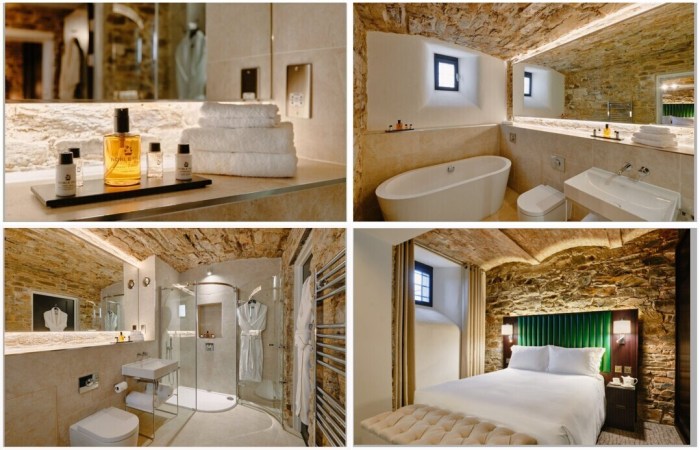
Boutique hotels excel by offering curated experiences that go beyond the standard amenities of larger chains. The focus is on creating a personalized and memorable stay, often incorporating local culture and unique design elements to enhance the overall atmosphere. This dedication to personalized service and unique offerings is what truly sets them apart.Exceptional amenities are carefully chosen to cater to the specific needs and desires of the discerning traveler, resulting in a truly unforgettable stay.
Personalized Service and Curated Experiences
The level of personalization in boutique hotels surpasses that of larger chains. While larger hotels may offer some personalized services, they often lack the intimate, hands-on approach characteristic of boutique hotels. Boutique hotels frequently employ a higher staff-to-guest ratio, allowing for more individualized attention. For instance, a concierge might proactively arrange private tours or dinner reservations based on a guest’s expressed interests, rather than simply responding to requests.
This proactive approach creates a seamless and personalized experience from check-in to check-out. In contrast, larger hotels often rely on standardized procedures and may struggle to cater to individual needs as effectively.
Gourmet Culinary Offerings
Many boutique hotels feature exceptional dining options that go beyond the typical hotel restaurant. Instead of mass-produced meals, they often partner with local chefs or offer unique culinary experiences, such as private chef dinners or cooking classes featuring regional specialties. These experiences provide guests with an opportunity to immerse themselves in the local culture through food, creating a lasting memory.
A hypothetical example could be a boutique hotel in Tuscany offering a private pasta-making class followed by a dinner featuring the pasta created by the guest, paired with local wines. This surpasses the typical hotel restaurant experience by offering a hands-on, immersive culinary journey.
Spa and Wellness Treatments
Boutique hotels frequently boast luxurious spas offering a range of treatments using high-quality, locally sourced products. These spas may focus on specific wellness philosophies or incorporate unique elements of the local environment, such as using locally harvested herbs or incorporating traditional healing techniques. The experience is designed to be tranquil and rejuvenating, going beyond a simple massage to provide a holistic wellness experience.
Imagine a boutique hotel nestled in a mountain resort offering a traditional herbal bath infused with locally grown botanicals, followed by a rejuvenating massage using essential oils extracted from the region’s flora. This unique experience contrasts sharply with the more generic spa offerings of larger hotel chains.
Unique Activities and Local Experiences, Unique Boutique Hotels You Shouldn’t Miss
Boutique hotels often curate unique activities and experiences that are specifically tailored to their location and the interests of their guests. This might include private guided tours, access to exclusive events, or opportunities to participate in local traditions. These experiences allow guests to connect with the destination on a deeper level and create memories beyond the hotel walls. For example, a boutique hotel in a coastal town might arrange a private boat tour to explore hidden coves or offer a guided foraging walk to discover local edible plants.
This goes beyond the typical sightseeing tours offered by larger hotels, providing more intimate and personalized interactions with the local environment.
High-Tech Amenities with a Personal Touch
While technology plays a role, boutique hotels often integrate it seamlessly and subtly, enhancing rather than overwhelming the guest experience. This might include smart room controls, high-speed Wi-Fi, and state-of-the-art entertainment systems, all seamlessly integrated into the design to avoid feeling intrusive. However, the focus remains on personalized service. For example, a digital concierge system might offer personalized recommendations based on a guest’s preferences, rather than simply providing a list of generic options.
This blend of modern convenience and personalized attention creates a sophisticated and comfortable stay, a significant difference from the often impersonal technological integration found in larger chains.
Illustrative Examples of Unique Boutique Hotels
This section showcases three distinct boutique hotels, each offering a unique blend of architecture, amenities, and overall atmosphere. These examples illustrate the diversity and high standards found within the world of boutique hotel experiences, highlighting the commitment to personalized service and memorable stays. The hotels selected represent different styles and locations, providing a broad perspective on what makes a boutique hotel truly exceptional.
The Brando, French Polynesia
The Brando is a luxurious private island resort in French Polynesia, offering unparalleled seclusion and breathtaking views of the turquoise lagoon. The resort’s villas are designed in a traditional Polynesian style, with thatched roofs and open-air living spaces. Amenities include private plunge pools, personal butlers, and a variety of water sports. The overall atmosphere is one of unparalleled tranquility and refined luxury.
Guests can enjoy pristine beaches, world-class dining, and a range of wellness activities.
The Brando’s unique selling points are its unparalleled privacy, stunning natural beauty, and commitment to sustainable luxury. The eco-conscious design and emphasis on personalized service create an unforgettable experience of relaxation and indulgence. The villas’ open-air design and access to pristine beaches offer an unparalleled connection with nature, while the resort’s commitment to sustainability ensures a responsible and environmentally conscious stay.
Hotel Santa Caterina, Amalfi Coast, Italy
Nestled on the cliffs overlooking the Amalfi Coast, Hotel Santa Caterina boasts stunning views of the Mediterranean Sea. Its architecture blends traditional Italian design with modern amenities, creating a sophisticated and elegant atmosphere. The hotel features a beautiful infinity pool, a Michelin-starred restaurant, and a private beach. Guests can enjoy breathtaking sunsets, explore charming coastal towns, and indulge in exceptional culinary experiences.
Hotel Santa Caterina’s unique selling proposition is its breathtaking location and the seamless blend of classic Italian charm with modern luxury. The stunning views, coupled with the hotel’s exquisite amenities and personalized service, create an unforgettable stay. The combination of elegant architecture, world-class dining, and access to the Amalfi Coast’s rich cultural heritage makes it a truly special destination.
The Library, Koh Samui, Thailand
The Library is a stylish and contemporary hotel on Koh Samui, known for its striking architecture and vibrant atmosphere. The hotel’s design is inspired by a modern interpretation of traditional Thai architecture, with sleek lines and bold colors. Amenities include a stunning infinity pool overlooking the Gulf of Thailand, a trendy bar, and a sophisticated restaurant. The overall atmosphere is one of chic sophistication and playful energy.
Guests can enjoy the beautiful beaches, explore the island’s cultural attractions, and experience the vibrant nightlife.
The Library’s unique selling points are its distinctive architecture, vibrant atmosphere, and prime location on Koh Samui. The hotel’s stylish design, coupled with its exceptional amenities and access to the island’s natural beauty and cultural experiences, creates a memorable and sophisticated getaway. The hotel’s bold design and lively social scene appeal to a younger, more energetic clientele seeking a stylish and fun-filled vacation.
The Future of Unique Boutique Hotels
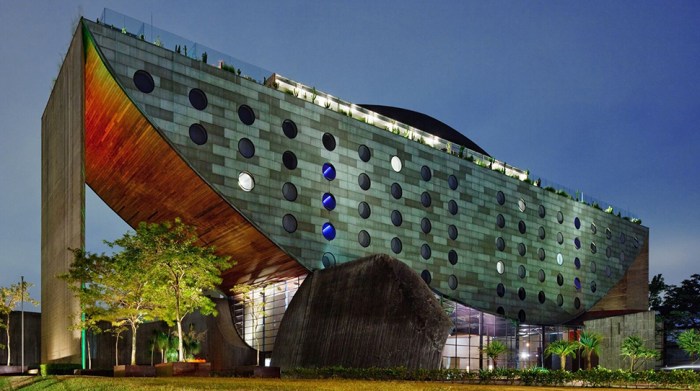
The unique boutique hotel sector is poised for significant transformation in the coming years, driven by evolving guest expectations, technological advancements, and a growing focus on sustainability. These changes will redefine the guest experience, architectural design, and operational strategies within the industry. The future will belong to those establishments that successfully adapt to these emerging trends.The evolution of unique boutique hotels will be shaped by several key factors, including a heightened emphasis on personalized experiences, the integration of advanced technologies, and a commitment to environmentally conscious practices.
We can expect to see a convergence of luxury and technology, resulting in highly customized and seamless guest journeys.
Sustainable and Eco-Conscious Design
Increasingly, travelers are prioritizing sustainable travel options. Boutique hotels are responding by incorporating eco-friendly building materials, implementing energy-efficient systems, and reducing their carbon footprint through initiatives like water conservation and waste reduction programs. For example, some hotels are utilizing solar power, installing rainwater harvesting systems, and sourcing locally produced food for their restaurants. This trend will only accelerate, with guests actively seeking out hotels with demonstrable commitments to environmental responsibility.
Hyper-Personalization and Technology Integration
Technology will play a pivotal role in shaping the future guest experience. Expect to see a rise in personalized service through AI-powered chatbots offering 24/7 assistance, customized room preferences based on past stays and preferences, and smart room technologies controlling lighting, temperature, and entertainment systems. Mobile check-in and keyless entry systems will further streamline the arrival process. The use of augmented reality (AR) and virtual reality (VR) could also transform the guest experience, allowing for virtual tours of the hotel or even immersive experiences within the hotel itself.
For instance, a hotel might offer a virtual tour of local attractions or a historical overview of the building’s architecture using AR technology.
Experiential Amenities and Local Immersion
The future of boutique hotels lies in providing curated experiences that go beyond simply offering a place to sleep. This involves forging strong partnerships with local businesses and artisans to offer unique activities and services that immerse guests in the local culture. Think curated walking tours led by local experts, cooking classes focusing on regional cuisine, or exclusive access to local events and workshops.
The emphasis will shift from generic amenities to highly personalized and locally-focused offerings that create lasting memories. Examples include partnerships with local wineries for private tastings or collaborations with artists for exclusive art workshops within the hotel.
The Rise of Wellness and Wellbeing
Wellness tourism is booming, and boutique hotels are capitalizing on this trend by incorporating wellness-focused amenities and services. Expect to see a greater emphasis on fitness centers, spa treatments, meditation rooms, and healthy dining options. Some hotels are even partnering with wellness experts to offer yoga retreats, mindfulness workshops, and personalized wellness programs. This trend reflects a growing consumer desire for holistic wellbeing and a focus on mental and physical health during travel.
Hotels might incorporate features like on-site yoga studios, specialized wellness menus, or partnerships with local health practitioners to offer personalized consultations.
Outcome Summary
In conclusion, the allure of unique boutique hotels lies in their ability to seamlessly blend exceptional design, personalized service, and captivating cultural experiences. These hotels are more than just places to stay; they are destinations in themselves, offering a curated escape that caters to the discerning traveler’s desire for authenticity and memorable moments. Whether drawn to historical charm, modern minimalist aesthetics, or vibrant cultural immersion, the world of unique boutique hotels promises an unforgettable journey for every discerning guest.
The future of this sector looks bright, with innovative technologies and evolving design trends continuing to elevate the guest experience to new heights.
FAQ Guide: Unique Boutique Hotels You Shouldn’t Miss
What is the average price range for a stay at a unique boutique hotel?
The price range varies significantly depending on location, amenities, and time of year. Expect to pay more than a standard hotel, but the premium often reflects a higher level of service and unique experience.
How do I find unique boutique hotels that fit my travel style?
Utilize online travel agencies specializing in boutique hotels, read online reviews and travel blogs, and consider consulting with a travel agent specializing in luxury or unique travel experiences.
Are unique boutique hotels suitable for families?
While many boutique hotels cater to couples or solo travelers, some offer family-friendly options. It’s crucial to check the hotel’s amenities and policies to ensure they meet your family’s needs.
What are the typical booking policies for unique boutique hotels?
Booking policies vary but often involve prepayment or a deposit, and cancellation policies can be stricter than those of larger hotel chains. Always review the terms and conditions carefully before booking.
Are pets allowed in unique boutique hotels?
Pet policies vary widely depending on the hotel. It is essential to contact the hotel directly to inquire about their pet policy and any associated fees before making a reservation.

